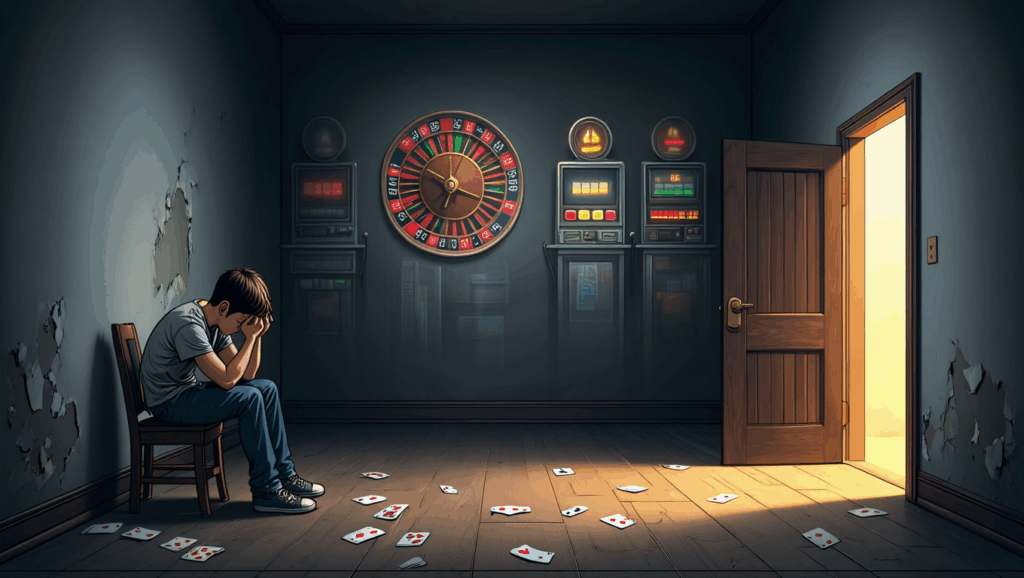
How to Tell if You or Someone You Care About Is Addicted to Gambling and Casinos
What is an addiction to gambling?
Gambling addiction or ludomania is a serious mental health condition that makes people want to gamble even when it has bad effects. Many people want to know how to tell if they or someone else has ludomania before it gets worse.
The addiction often starts as a harmless habit but quickly becomes a pattern that affects daily life, finances, and relationships. The condition affects the brain’s reward system, making gambling feel like a necessary escape or source of excitement.
Knowing what addiction is and how to spot its signs early can help people get help. The first step toward recovery is to be aware of the problem.
Common Signs of Trouble
The first step to getting better is to admit that you have an addiction. Some symptoms that you could be addicted to betting are:
- Spending more money and time gambling than planned
- Feeling restless or irritable when trying to cut down or stop
- Using bets as a way to escape stress or emotional pain
- Lying to family or friends about gambling habits
- Chasing losses by betting more to recover lost money
- Neglecting personal and professional responsibilities due to gambling
If you see these signs, you may be showing signs of addiction that need to be dealt with right now. Early detection can stop bad things from happening. You should act on these indications as soon as you see them.
How to Tell if Someone You Care About Has a Gambling Problem
It might be hard to see if someone you care about has a gambling issue since they typically disguise it. Some common signs are:
- Sudden secrecy about finances or unexplained debts
- Changes in mood, such as anxiety, depression, or irritability
- Withdrawal from family and social activities
- Borrowing money or selling possessions to fund gambling
- Repeated unsuccessful attempts to stop gambling
- Neglecting work or daily responsibilities
Being observant and compassionate helps support loved ones before their problem worsens. Learning how to recognize addiction signs in others can save relationships and lives. Remember, early intervention can prevent long-term damage.
Emotional and Financial Consequences
Gambling addiction leads to severe emotional distress and financial hardship. The emotional consequences often include:
- Chronic stress and anxiety
- Feelings of guilt and shame
- Depression and low self-esteem
- Social isolation and damaged relationships
Financially, gambling can cause:
- Significant debt accumulation
- Bankruptcy or loss of savings
- Difficulty meeting daily living expenses
Recognizing these consequences highlights the urgency of seeking betting addiction as soon as possible to avoid lasting damage. Understanding these effects also helps to motivate affected individuals to seek recovery.
When Gambling Becomes a Habit
A lot of people become addicted to gambling because they use it to deal with problems. Gambling might help you feel better for a short time if you’re stressed, anxious, or depressed. This respite, on the other hand, doesn’t last long and often leads to a bad cycle of reliance.
To quit being addicted to casinos or gambling, you need to deal with the emotional problems that are causing the addiction and come up with other ways to deal with stress. If you don’t do this, the addiction usually becomes worse over time, which makes the cycle worse. Getting well requires both expert help and a personal commitment.
How to Talk to Someone About Their Addiction
Approaching a loved one about their gambling problem requires sensitivity. Here are some tips to start a conversation:
- Choose a calm and private moment to talk
- Express your concerns without judgment or blame
- Use “I” statements, such as “I’m worried about you.”
- Encourage them to open up about their feelings and struggles
- Offer support and suggest seeking professional help
Being patient and understanding increases the chances of a positive response. If you need guidance, resources on betting addiction help can provide valuable assistance. Remember, your support may be the first step they need.
Where to Get Help and Support
Help is available for those struggling with gambling addiction. Effective treatment options include:
- Counseling and therapy, especially cognitive-behavioral therapy (CBT)
- Support groups like Gamblers Anonymous
- Helplines and online resources
- Financial counseling and planning services
Knowing how to stop gambling addiction is the first step toward recovery. Encouraging yourself or your loved ones to seek professional support is crucial in breaking free from addiction. Recovery is possible, and you are not alone in this journey.
If you suspect a problem, don’t wait. Early intervention can make a significant difference. One must remember that ludomania is treatable, and help is always available.
